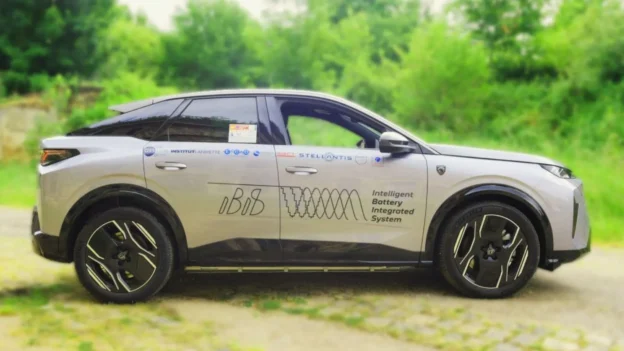Stellantis, in collaboration with Saft, a subsidiary of TotalEnergies, has unveiled the first prototype electric vehicle equipped with IBIS (Integrated Battery Inverter System) technology, an integrated smart battery system that promises to revolutionize energy storage and conversion in mobile and stationary applications.
The electric vehicle prototype
The vehicle chosen for this demonstration is a Peugeot E-3008, built on the STLA Medium platform. This working prototype is the result of years of joint research between Stellantis, Saft, E2-CAD, Sherpa Engineering and prestigious French institutions such as the CNRS, Paris-Saclay University and the Institut Lafayette.
IBIS reinvents the electric propulsion system by integrating the inverter and charger functions directly into the battery, regardless of its chemical composition. This architecture makes it possible to supply energy in alternating and direct current, powering the engine, the electrical grid and the vehicle’s auxiliary systems, simplifying design and improving efficiency.
The technical benefits are significant: up to 10% improvement in energy efficiency, a 15% increase in motor power, weight reduction of approximately 40 kg and release of up to 17 liters of usable volume. In addition, a 15% reduction in charging time and 10% energy savings have been observed, along with easier maintenance and greater potential for battery reuse.
Ned Curic, Director of Engineering and Technology at Stellantis, stressed that “simplification is innovation”, while Hervé Amossé, Executive Vice President of Saft, underlined his company’s leadership in smart and sustainable energy solutions.
The second phase of the project began in June 2025, supported by the French government through the France 2030 program. It is expected that this technology can be integrated into Stellantis production vehicles by the end of the decade.
Beyond the automotive sector, IBIS has potential for applications in the rail, aerospace, maritime and data center sectors, cementing Stellantis and Saft’s commitment to scalable and sustainable electrification.
The IBIS project, launched six years ago, represents a pioneering collaboration between industry and academic research, with the support of ADEME and the French Future Investment Plan. Its development reflects a strategic commitment to clean, efficient energy technologies that are adaptable to the challenges of the future.
Source and photo: Stellantis

